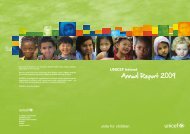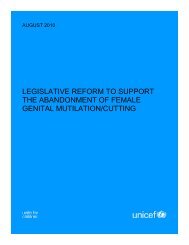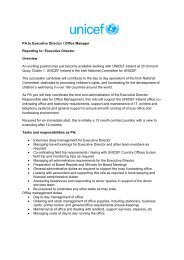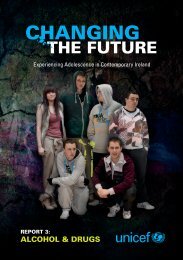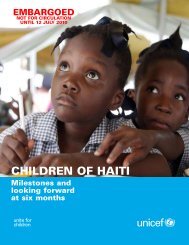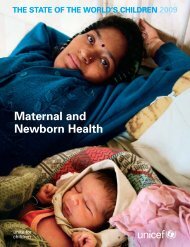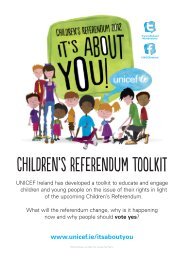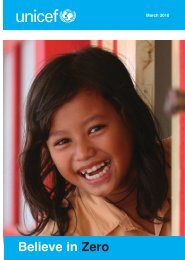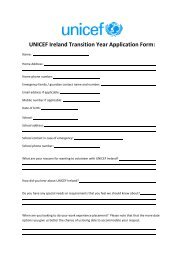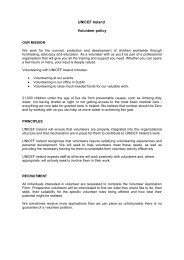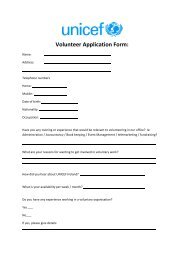Djibouti<strong>Children</strong> and women in crisisFood and water, intimately interlinked, cannot be taken <strong>for</strong> granted in Djibouti. Rainfall sinceSeptember 2007 has been less than half the normal average 1 and the drought has testedthe population’s ability to adequately feed itself. As the country’s children and women faceparched earth and extreme undernutrition, an influx of refugees from conflict in neighbouringSomalia further stretches resources and government capacity. In Djibouti, 120,000 people –15 per cent of the population – are already experiencing a crushing lack of food, health care,nutrition support, drinking water and sanitation facilities. The number of asylum seekers inDjibouti increased by 20 per cent over the last year, to some 14,500 by late 2010. 2<strong>Humanitarian</strong>funding at work:Highlights from 2010By late 2010, UNICEF hadmade significant achievementsin nutrition, health,sanitation and hygiene, aswell as improvements ineducation and the welfare ofchildren. Some 70 per centof children who suffer fromsevere acute malnutritionwere enrolled into thecountry’s 20 therapeuticfeeding centres and 30community therapeuticcentres. About 75 per centof families in affected areasbenefited from rehabilitateddrinking-water sources andincreased hygiene supplies.Social services helpedprotect and support 700vulnerable and orphanedchildren, all of whomreceived clothing. Out of the700, only 461 children go toschool; they received schoolkits and have access totutoring. Forty-seven benefitfrom vocational training.And 195 children living onthe streets gained accessto a safe, child-friendlyenvironment with adequatesanitation.Meeting urgent needs and building resilience in <strong>2011</strong>UNICEF, together with the Government of Djibouti, NGOs and partners, will help improve thewell-being of 120,000 people affected by drought and other hardships, including 5,000 womenand 25,000 girls and 29,000 boys, in the following ways:• Management of undernutrition will be strengthened within 40 health centres with the scalingup of a community-based approach, and blanket feeding will be implemented in 10 healthcentres.• Nearly 25,000 children aged 6–59 months will stay healthier after receiving essential vaccinesand immunizations, and 15,000 children will receive deworming tablets.• 30 clean water sources will be rehabilitated and expanded. Hygiene promotion campaignswill help people in the northern and western regions adopt healthier practices.• 10,000 orphans and vulnerable children will receive social service packages (access toschool, conditional cash transfers <strong>for</strong> food consumption and vocational training <strong>for</strong> schooldropouts); additionally, a drop-in centre will cater to the needs of 500 street children.• Around 42,000 adolescents will be able to better protect themselves from HIV by usingessential in<strong>for</strong>mation provided through community mobilization, capacity building andcommunication <strong>for</strong> development.Funding requirements <strong>for</strong> <strong>2011</strong>In 2010, the UN system in Djibouti launched a US$39 million Drought Appeal, covering theperiod from October 2010 to October <strong>2011</strong>. This Appeal includes nearly US$4.8 million <strong>for</strong>nutrition and water, sanitation and hygiene interventions carried out by UNICEF. 3 In line withthis, UNICEF is requesting US$4,255,000 <strong>for</strong> its <strong>2011</strong> humanitarian work in Djibouti to respondto the increasing needs of the population affected by persistent drought, food insecurity andconflicts in neighbouring countries. Without funding <strong>for</strong> the key activities described above,the shortfall of food, water and safe housing will continue to threaten the welfare of Djibouti’schildren and women.More in<strong>for</strong>mation on achievements of 2010 and the humanitarian action planned <strong>for</strong>Djibouti in <strong>2011</strong> can be found at www.unicef.org/hac<strong>2011</strong> or on the country officewebsite at www.unicef.org/djibouti.1. United Nations, ‘Djibouti Drought Appeal’, Office <strong>for</strong> the Coordination of <strong>Humanitarian</strong> Affairs, New York andGeneva, 2010, p. 1.2. Ibid.3. United Nations, ‘Djibouti Drought Appeal’, Office <strong>for</strong> the Coordination of <strong>Humanitarian</strong> Affairs, New York andGeneva, 2010, p. 4.UNICEF EMERGENCY NEEDS FOR <strong>2011</strong> (in US dollars)Total $4,255,000600,000 Health400,000Child protection1,875,000 Nutrition1,250,000 WASH80,000 Education50,000 HIV and AIDS48 <strong>2011</strong> UNICEF <strong>Humanitarian</strong> <strong>Action</strong> FOR CHILDREN | www.unicef.org/hac<strong>2011</strong>Djibouti
Iraq and vulnerable Iraqis in Egypt, Jordan, Lebanonand the Syrian Arab Republic<strong>Children</strong> and women in crisisUnremitting violence not only sets the backdrop of daily life in much of Iraq, it has also weakenedgovernance and crippled the ability of the country to feed, protect and educate its citizenry.Political and economic turmoil has led to the great vulnerability of women and children, who arethreatened by poverty, undernutrition, lack of safe water and sanitation, insufficient educationalresources and the prospect of personal violence and abuse. Iraqis must contend with threats ofdrought, decimated infrastructure and a large population of refugees and internally displacedpeople. The number of displaced Iraqis is counted in the millions, with a large number of Iraqisseeking refuge in neighbouring countries and over a million displaced inside the country sincethe height of 2006 violence. Return of people to their homes is thwarted by continuing fears andinsecurity. Vulnerable Iraqi women and children – whether in Iraq, Egypt, Jordan, Lebanon orthe Syrian Arab Republic – require sustained, intense assistance to assure basic living standardsand fundamental protection in a context of war, violence and political discord.<strong>Humanitarian</strong>funding at work:Highlights from 2010In 2010, UNICEF estimated thatUS$49,857,545 was neededto fund its humanitarian workin Iraq and neighbouringcountries. As of October 2010,a total of US$7,220,298 hadbeen received <strong>for</strong> Iraq and atotal of US$10,158,315 <strong>for</strong> theregional response to vulnerableIraqis living in Egypt, Jordan,Lebanon and the SyrianArab Republic. Despite theshortfall in funding, UNICEFprovided 7 metric tons of F100and F75 therapeutic milk <strong>for</strong>the recovery of over 2,000undernourished children inIraq. In Anbar, Basrah, Missanand Thiqar Provinces, 43,000children under 5 and 17,000pregnant women gained betteraccess to primary health care.Improved access to safe waterand sanitation was providedto over 1 million people in 48communities. Some 286,700students (38 per cent of themgirls) and 17,390 teachers (44per cent women) were directlysupported through emergencyeducation interventions.UNICEF also trained 750teachers and 7,500 children onrisks and prevention of abuse.Meeting urgent needs and building resilience in <strong>2011</strong>UNICEF has multiple cluster responsibilities in Iraq as lead of the education and WASHclusters, deputy lead of the health and nutrition cluster with the World Health Organization, anddeputy of the protection cluster with UNHCR. In <strong>2011</strong>, UNICEF will continue to work with theGovernments of Iraq, Egypt, Jordan, Lebanon and the Syrian Arab Republic, other UN agenciesand NGOs in addressing the needs of 3.5 million vulnerable Iraqis.• In Iraq, some 140,000 children and women will receive essential vitamins, nutrients andnutritional interventions to combat undernutrition. <strong>Children</strong> under age 5 will be a specialfocus in the 26 priority districts, including those in the Marshlands and drought-affected areas.• In Iraq, training of medical personnel and expanding access to public health centres willgive 50,000 children and women better access to primary health care. Repair and expansionof three maternity wards will improve the chances <strong>for</strong> safe childbirth.• In Iraq, safe drinking water and improved sanitation will be provided to over 200,000 peoplein vulnerable communities in the 26 priority districts.• Educational support will benefit 300,000 children and youths in Iraq through creation orrehabilitation of learning facilities, and via second-chance learning <strong>for</strong> children who weredeprived of basic education as a result of conflict.• Services in Iraq <strong>for</strong> preventing, monitoring, reporting on and responding to child protectionviolations during emergencies will be strengthened. In Egypt, Jordan, Lebanon and theSyrian Arab Republic, UNICEF will continue to provide <strong>for</strong> recreational activities, outreachinterventions <strong>for</strong> the most marginalized and psychological support of Iraqi refugee childrenas well as building capacity of service providers to meet the basic social needs of Iraqi refugeechildren. About 100,000 people in Iraq will be reached with awareness-raising initiatives onHIV and AIDS and prevention of mother-to-child transmission.Funding requirements <strong>for</strong> <strong>2011</strong>UNICEF is requesting a total of US$40,056,000 <strong>for</strong> its work assisting vulnerable Iraqis:US$22,000,000 to carry out its planned activities in Iraq, US$14,200,000 to assist vulnerableIraqi women and children in the Syrian Arab Republic, US$2,831,000 <strong>for</strong> those living in Jordan,US$525,000 in Lebanon and US$500,000 in Egypt. This request is in line with the UNHCR-ledRegional Response Plan <strong>for</strong> Iraqi Refugees.More in<strong>for</strong>mation regarding results from 2010 and humanitarian action plans tobenefit Iraqis in <strong>2011</strong> can be found at www.unicef.org/hac<strong>2011</strong>.UNICEF EMERGENCY NEEDS FOR <strong>2011</strong> (in US dollars)Total $40,056,000IRAQ4,965,000 Health4,120,000 Child protection45,000 HIV and AIDS980,000 Nutrition7,840,000 WASHSYRIA 3,920,000 Child protection and ADAP*300,000 Cluster coordination3,570,000Education480,000Clustercoordination2,150,000 Health7,830,000 EducationJORDAN LEBANON EGYPT1,700,000 Education431,000 Cluster coordination700,000 Child protection325,000 Child protection200,000 Education500,000 Health*Adolescent development and participationwww.unicef.org/hac<strong>2011</strong> | <strong>2011</strong> UNICEF <strong>Humanitarian</strong> <strong>Action</strong> FOR CHILDREN 49




